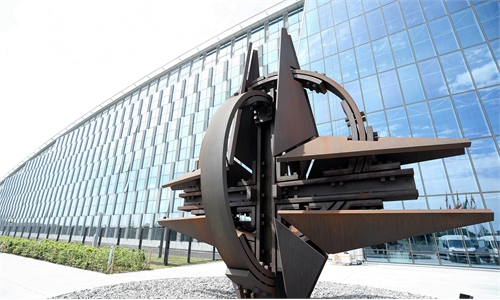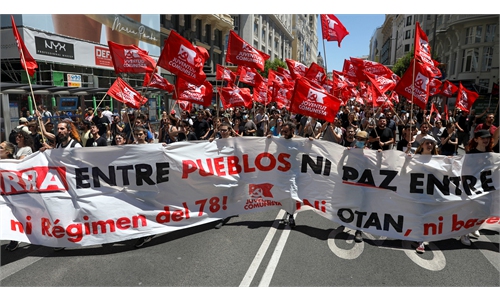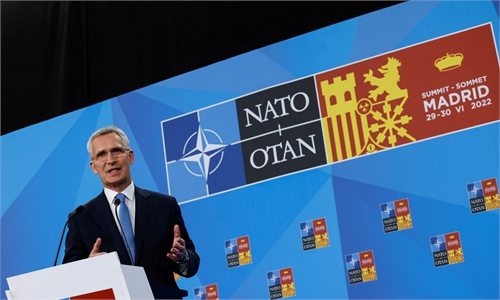IN-DEPTH / IN-DEPTH
NATO’s expansion, ‘going wherever I want’ posture bring instability, confrontations around the world
Expansionist obsession
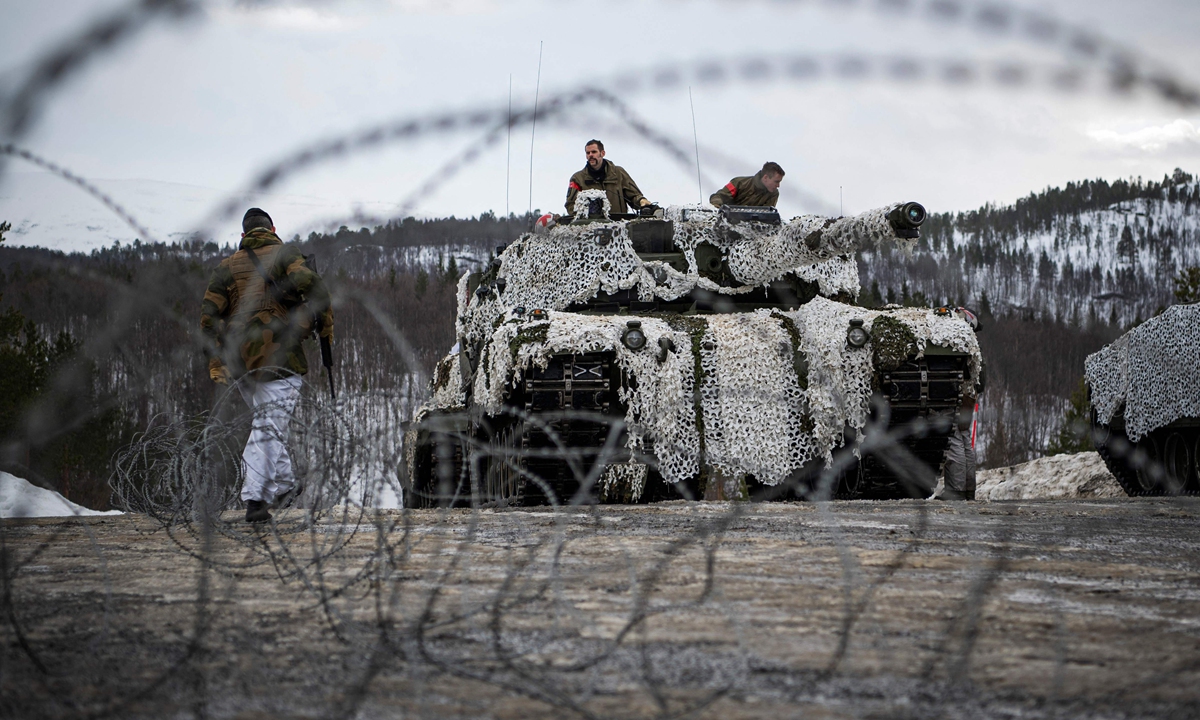
NATO holds the international military exercise Cold Response 22 at Setermoen, Norway, on March 22, 2022, with 30,000 troops from NATO member states involved in the exercise. Photo: VCG
Editor's Note:Amid the still ongoing Russia-Ukraine military conflict, NATO, which has been adding fuel to the conflict, started a three-day summit in Madrid, Spain, from June 28 to 30. The NATO alliance has been working to increase pressure on Russia over its conflict with Ukraine while underscoring their continued concerns about China. For the first time in history, Japanese and South Korean leaders were invited to attend the NATO summit. The militant group which has already been a source of trouble for Europe is now trying to create its own Asia-Pacific chapter to interfere in Asia. How did the organization come about? How was it born from the Cold War mentality and gradually became an obstructer of world peace? Why is this military alliance extending its "dark hand" to Asia? The Global Times will publish a series of four articles on how NATO is expanding. This is the third installment.
The Supreme Headquarters Allied Powers Europe of NATO in Mons, southern Belgium, and the NATO Headquarters in Brussels have different duties. The latter gathers diplomatic representatives of NATO members, while the one in Mons is the headquarter of NATO's military operations.
In April 2005, when the Global Times reporter visited the Supreme Headquarters Allied Powers Europe of NATO, a military officer, a major from the Czech Republic, said "You are the first Chinese journalist who has ever come here to conduct an interview as far as I know."
At that time, NATO was still making efforts to ease its relationship with China, and by accepting a Chinese journalist to visit was one of the signs.
However, a small two-story building at the heart of the NATO campus, which displayed the sign "Supreme Headquarters Allied Powers Europe," made the reporter feel extremely sad and indignant - in 1999, NATO's decision to bomb Federal Republic of Yugoslavia as part of the Kosovo War and the later bombing of Chinese Embassy in Belgrade also started from here.
The NATO summit that just concluded at the end of June is reversing the course of history. It not only mentioned China in the new Strategic Concept and constantly overstated "China threat," but also invited several Asia-Pacific countries for attendance to create an "Asia-Pacific version" of NATO. Such approaches have put people on high alert.
Since the end of the Cold War, NATO has been in an active period of engaging in military activities, launching many military operations, and completing the transformation of a military alliance from pure defense to "defense + intervention."
Today, NATO has assumed a posture of "going wherever I need to go" and "going wherever I want to go," and has increasingly become a "systemic challenge" that threatens world security and stability.
Expanding the Western camp
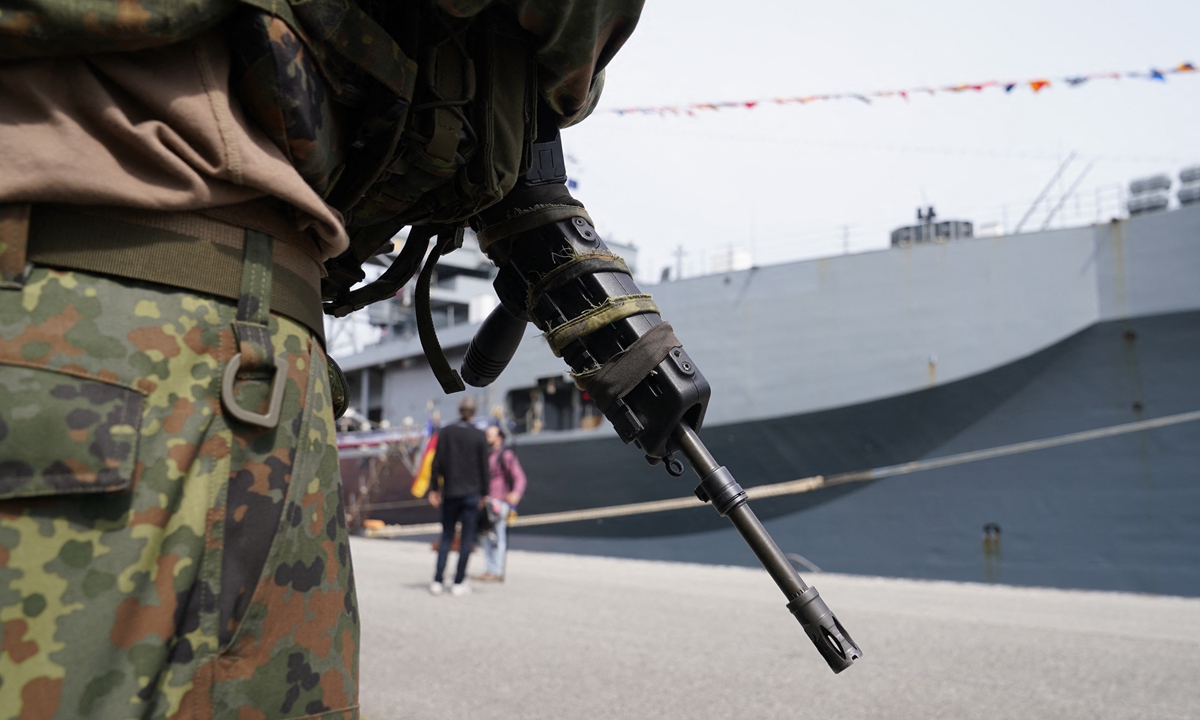
A soldier stands in front of the US ship "USS Mount Whitney" anchored at a naval base after the end of the NATO's Baltic Operations maneuver on June 17, 2022. Photo: AFP
In November 1989, the Berlin Wall fell. Two years later, the Warsaw Pact dissolved, and then the Soviet Union collapsed, ending the Cold War. The political pattern of Europe underwent historical changes.For this kind of change, in January 1989, then US president George H. W. Bush said in his inaugural speech: "I come before you and assume the Presidency at a moment rich with promise. We live in a peaceful, prosperous time, but we can make it better. For a new breeze is blowing, and a world refreshed by freedom seems reborn." Since then, the optimism that "history has changed" began to permeate Western countries.
After the Cold War, even though there were people who said that NATO experienced "brain death," as a relic of the Cold War era, NATO, especially the US, which wanted to lead its European allies through NATO, seized every opportunity and found various reasons for this military organization to walk the path of transformation and expansion.
The establishment of NATO was "a major event" in European history after World War II, marking the beginning of Europe's "grouplization." Shortly after WWII, Europe was divided in two, with two opposing camps facing off each other through the Iron Curtain. The different ideologies pursued by East and West Europe have led to political, economic, and military confrontations.
But in general, throughout the Cold War period, NATO, which focused on common defense, was somewhat subdued, with fixed defense zones, singular tasks, and remained in a defense status, doing nothing "outrageous."
Even in 1982, the UK, a member of NATO, and Argentina, fought over the sovereignty of the Malvinas Islands, an archipelago in the South Atlantic known to English speakers as the Falkland Islands. NATO did not activate the fifth article of mutual defense, because the battlefield was outside the NATO defense zone.
However, the US, which controls NATO, still gave strong support to the UK, demanding that France break the arms sales agreement previously signed with Argentina and stop the supply of weapons to Argentina. History has proven that NATO's unity is inseparable from "stick-style discipline."
After the end of the Cold War, a brand new security pattern emerged in Europe, but NATO has never discussed the issue of "leaving," but has instead focused on how to "stay." The transformation of NATO began by extending a "hand of friendship" to former adversaries - the former Warsaw Pact member states.
In 1991, NATO established the North Atlantic Cooperation Council (NACC) to engage in dialogue and cooperation with the former Warsaw Pact member states and began to reach out to Eastern Europe.
If we say that during the Cold War, the expansion of NATO was still limited to the interior of the Western world, and it still focused on collective military confrontation, then after the Cold War, NATO's expansion began to take on an expansionist nature, which is determined by NATO's political attributes.
As a military alliance, NATO is based on Western democratic values. The purpose of NATO was to ensure the "security and freedom" of its members, and after the Cold War, NATO's focus shifted to taking advantage of the "peace dividend" brought about by the end of the Cold War. It used the tendency of Central, Eastern, and Southern European countries moving closer to the West to expand the West's camp.
Today, NATO seeks to expand in all directions, and its strategic transformation aims to involve building global partnerships, adding new functions, breaking through traditional defense zones, and conducting off-zone military operations.
'Dark record' of transformation
After the end of the Cold War, NATO began to reposition itself, taking the so-called "uncertainties" represented by regional instability as new "dangers and challenges," and shifted from defending against traditional threats originating from Europe to defending against new threats from outside of Europe. From Europe to North Africa, from Middle East to Afghanistan, all of NATO's military operations took place after the end of the Cold War.
The Strategic Concept adopted by NATO in 1999 emphasized, for the first time, that NATO should "walk out of the defense zone" and shift from "collective defense" to "intervention" outside the defense zone, which means that NATO has basically established the principle that "military action can be taken without the authorization of the UN Security Council."
Among them, the so-called "humanitarian war" launched by NATO against Federal Republic of Yugoslavia in 1999, or the Kosovo War, blatantly violated the Charter of the United Nations and the universally recognized norms of international relations. After bypassing the UN, without the authorization of the UN Security Council, NATO launched a 78-day bombardment, setting a bad precedent in international relations and causing a severe humanitarian crisis.
Then UN Secretary-General Kofi Annan severely criticized NATO's unilateral military actions. He emphasized that, according to the UN Charter, the UN Security Council has the primary responsibility of maintaining world peace and security, which was clearly recognized by NATO. Therefore, the Security Council should be involved in any decision involving the use of force.
The famous American linguist and philosopher Noam Chomsky also sternly condemned NATO's military action, saying that its purpose was to build a Western neoliberal social and economic system in the country.
After the 9/11 attacks, NATO's "enemies" changed from fixed to invisible ones, as "terrorism threats" became NATO's biggest worry, and anti-terrorism has since become the topmost priority. In response, NATO established the high-readiness Response Force, which not only continued to undertake the collective defense function of Article 5 of the North Atlantic Treaty but also began to perform military tasks that are not in the collective defense of Article 5, assuming the posture of "going wherever I need to go" and "going wherever I want to go."
On October 7, 2001, as the US-led coalition launched the Afghan war, NATO conducted its first large-scale military intervention outside Europe under the 1999 Strategic Concept. In 2003, the US fabricated the lie that Iraq possessed weapons of mass destruction and joined forces with the UK and other NATO allies to launch the Iraq War. The intention of NATO to gradually transform from a military alliance with only regional functions to a political and military alliance that can play a global role became obvious.
In 2011, NATO abused the authorization of the UN Security Council to launch a military strike against Libya. This is another obvious example of NATO, out of self-interest, conducting foreign military interventions and regime changes after the Cold War.
On October 31 of the same year, Anders Fogh Rasmussen, the then NATO Secretary-General, arrived in Libya on a US-made C-130 transport plane, escorted by two French Phantom fighter jets. The surprise visit was the first by a NATO secretary-general to the North African country.
When top NATO officials announced the end of the "Joint Protector" operation against Libya, they would have never thought that tens of thousands of Libyan civilians would be killed in the civil war after NATO's intervention, let alone the country still being largely unstable today.
NATO's strategic transformation has greatly exacerbated Russia's insecurity while changing the European security pattern. After the Russia-Ukraine conflict began, NATO said in a showdown that it would no longer honor its previous commitments to Russia.
No military deployment to Eastern Europe is a commitment NATO made to Russia during its first eastward expansion after the Cold War, and it was also written into the basic document agreed upon with Russia. Now, with NATO's formal completion of accession talks with Sweden and Finland, and the US announcing that it will have its troops permanently stationed in Poland, these actions are bound to further intensify the confrontation between Russia and NATO.
The inevitable fall from grace
Analysts pointed out that although NATO claims to be the most powerful military alliance in history, its internal contradictions have always existed. Even after the Cold War, NATO's strategic transformation has not been smooth sailing and has been marred by contradictions between the US and European countries.
Since the 1950s and 1960s, when Europe embarked on the road to unity and self-reliance, conflicts between the US and European countries emerged in the political, economic, and military spheres. This was highlighted by the former French president Charles de Gaulle's withdrawal of French forces from NATO's command in 1966 at the height of the Cold War and later forcing military institutions such as NATO's headquarters and the Supreme Headquarters Allied Powers Europe to leave France.
Experts noted that with the gradual progress of European integration, the US and Europe have been competing around the issue of the independent defense of Western Europe. In order to maintain hegemony, the US has been strongly opposed to the establishment of any independent defense of Europe aimed at weakening NATO, which is strongly resented by some EU countries such as France.
In 2003, France and Germany openly objected to the US bypassing the UN to wage a war in Iraq.
In 2020, German-US relations were negatively impacted by the Trump administration's "America First" ethos, leading to increasing conflicts and growing rifts between the two sides in diplomatic and defense fields. US media outlets including the National Interest commented that the two countries have gradually fallen to their lowest points of interaction since the Cold War.
French President Emmanuel Macron's comments on "the brain death of NATO" and Europe's strategic autonomy became the latest manifestation of the existing contradictions between the US and Europe under the Trump administration.
Currently, the escalation of the Russia-Ukraine conflict has temporarily overshadowed the differences between European countries and the US, and Europe has again become intentionally dependent on the US military umbrella, experts noted.
But experts also pointed out that, in the long run, the continued expansion of NATO will inevitably lead to the diversification and decentralization of interests.
"As they send more howitzers and drones to Ukraine, NATO leaders need to pay close attention to the economic and political blowback from the war on their own societies. When they do so, they will better appreciate the need to facilitate a cease-fire and support Ukraine's cause at the negotiating table," Charles Kupchan, a professor of International Affairs at Georgetown University, wrote in the Foreign Affairs.
Today, NATO is still indulging in a mindset of Cold War and bloc politics, stressing the absolute security of one group regardless of the security interests of the others. The US especially, along with some NATO member states, is trying to expand the circle of influence of Western ideology and to find and establish new opponents. NATO's set of operations will inevitably lose the hearts and minds of other countries, the so-called "most successful alliance in history" and its decline will become inevitable, experts said.
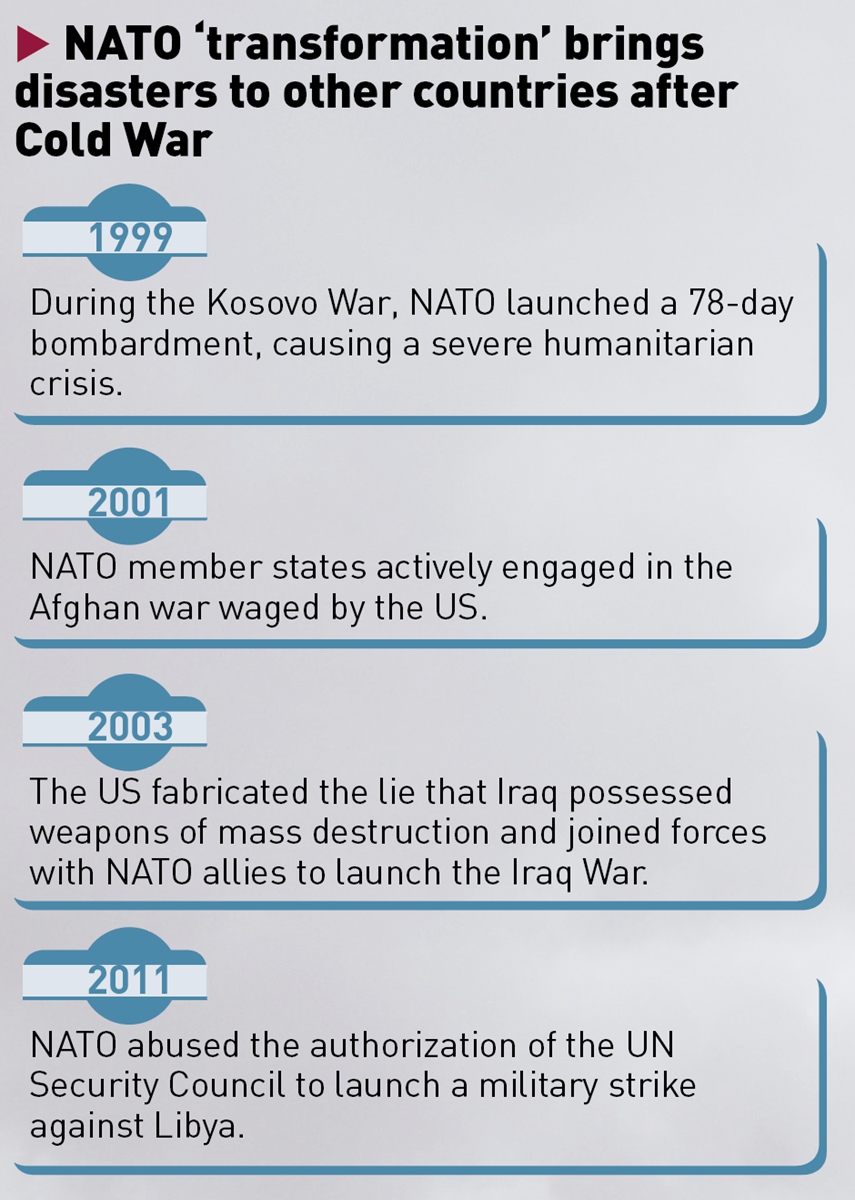
Graphic: GT
